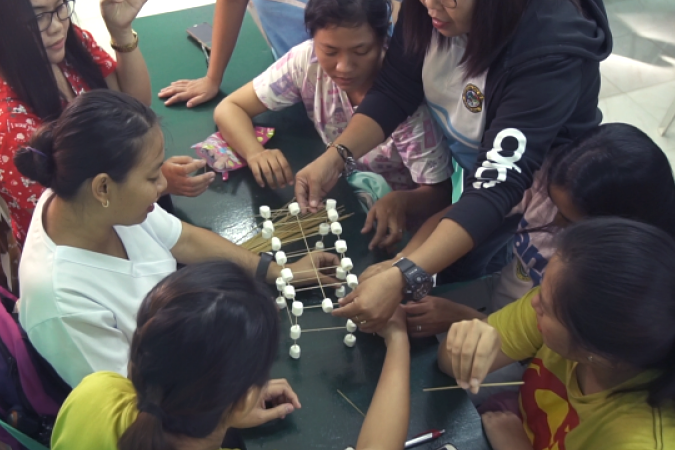
iPRIME Study team pilots learning modules for primary care providers in remote rural Philippines
The iPrime project, which ethnographically looked into the experiences and perceptions of primary care physicians in rural settings, extends the impact of its research findings by piloting innovative primary care learning modules in the municipality of Bobon, Northern Samar. The study team is led by Dr. Manuel Dayrit, Professor at the Ateneo School of Medicine and Public Health and ACRI.
The Ateneo de Manila University Center for Health Evidence, Action, and Leadership, through the Newton Fund funded iPRIME Study, has recently conducted a pilot implementation of an innovative module on Team Leadership and Health Facility Management for primary care teams. The pilot implementation was conducted last 15-17 October 2019 at the Municipality of Bobon in the Province of Northern Samar.
The Ateneo de Manila University Center for Health Evidence, Action, and Leadership (AHEALS), through the Newton Fund funded iPRIME Study, has recently conducted a pilot implementation of an innovative module on Team Leadership and Health Facility Management for primary care teams. The pilot implementation was conducted on 15-17 October 2019 in the Municipality of Bobon in the Province of Northern Samar.
The iPRIME Study team, under the guidance of Dr Manuel Dayrit of the Ateneo School of Medicine and Public Health (ASMPH) and Prof Andrew Hassel and Dr Lisa Dikomitis of Keele University, conducted an ethnographic study on the competencies and learning needs of primary care physicians in remote rural Philippines. The study found that primary care physicians working in remote rural areas have unique non-clinical learning needs brought about by their myriad roles and geographic challenges. Physicians in these settings primarily require training on non-clinical topics and skills such as politics in healthcare, financial management, human resource management, and facility management, among others. Because their learning needs are very distinct, it is difficult for them to receive the training that they require; and should there be training available, it is often outside of their area of practice such that they have to leave for days at a time at the expense of the delivery of healthcare services.
These findings became the jump off point upon which a primary care physician Competency Map and, subsequently, training modules were developed. The modules were designed so that they are self-directed and workplace-based; the learning materials and tools easy to understand and utilised without the guidance of the module developers. This makes the modules a significantly more feasible and sustainable method of training, as learning is not conducted at a distant venue nor dependent on an external instructor.
In the pilot implementation of the Team Leadership and Health Facility modules for primary care teams, the learning activities were designed to be interactive – doing away with the standard didactic method. The activities were composed of games, group discussions, role playing, and video viewing. These activities were done as a team and were facilitated by the primary care physician. This mode of instruction created a more conducive space for discourse and learning within the health team and resulted in more engaged and motivated learners.
The iPRIME primary care physician Competency Map is composed of a total of eight areas that cover managerial, leadership, regulatory, ethical, clinical, and public health competencies, among others. In addition to the modules on Team Leadership and Health Facility Management, several other modules can be developed in order to respond to the entirety of the learning needs of the countries frontline primary care providers.
iPRIME is the short name of the AHEALS-Newton Fund project entitled Transforming Primary Healthcare in the Philippines: An Innovative Pilot Postgraduate Professional Development Program for Primary Physicians in the Province of Northern Samar.
For more information about iPRIME, please visit the project website at www.ateneo.edu/heals/iprime
-

Health workforce issues and recommended practices in the implementation of Universal Health Coverage in the Philippines: a qualitative study.
The Philippines' Universal Health Coverage program faces a critical workforce crisis that threatens its very foundation. A new Ateneo de Manila University study reveals that while the country exports healthcare workers globally, it struggles to retain the professionals needed for its own ambitious health reforms. With only 7.92 physicians per 10,000 population and a shortage of 127,000 nurses, systemic barriers—from restrictive hiring policies to uncompetitive salaries—are driving away the very people meant to deliver healthcare for all Filipinos. The research identifies promising solutions, including scholarship programs and comprehensive benefits, but warns that without addressing these fundamental workforce issues, universal healthcare remains at risk.
-

Measuring and Understanding Geographic Inequities in Physician Distribution in the Philippines
Access to quality health care in the Philippines is shaped not only by the availability of physicians, but also by how equitably they are distributed across regions. Many communities, particularly in rural and geographically isolated areas, continue to face limited access to medical professionals, while urban centers often see a concentration of physicians and specialists. The project Measuring and Understanding Geographic Inequities in Physician Distribution in the Philippines seeks to address this challenge by providing a clear, evidence-based picture of physician maldistribution nationwide.
